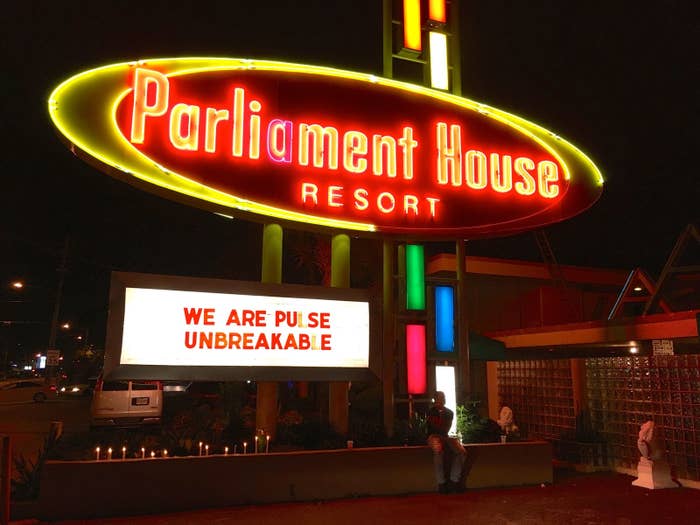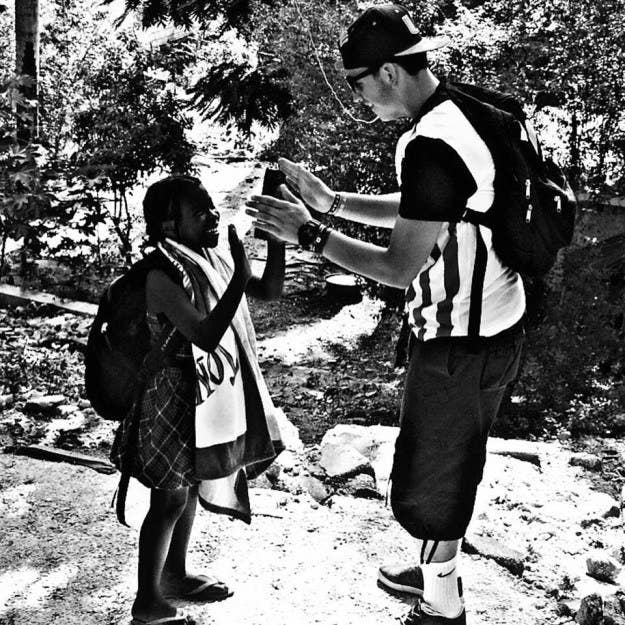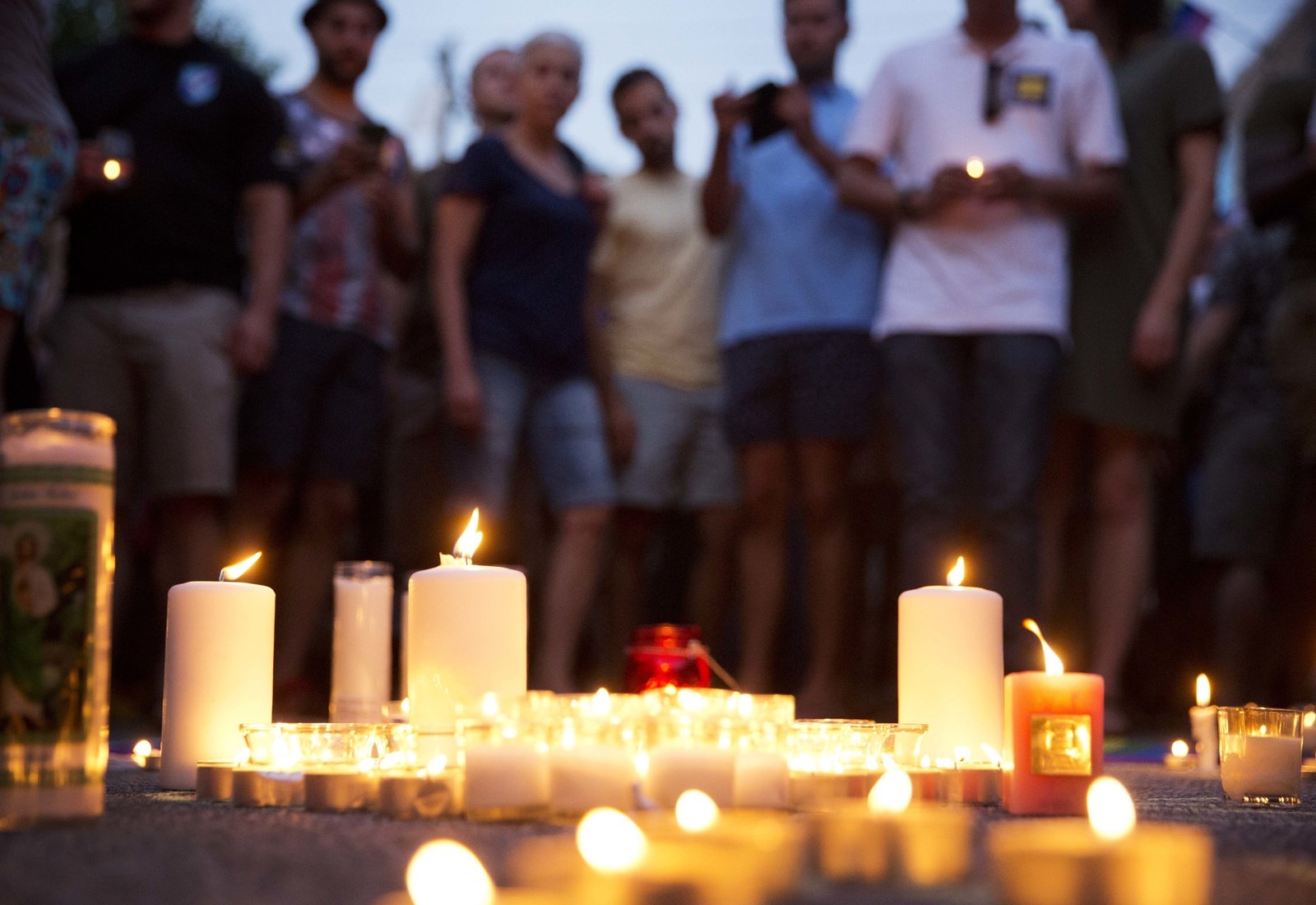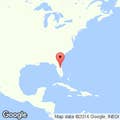
ORLANDO — When Enakai Mpire woke up on Sunday, the death toll from the shooting at Pulse nightclub was already at 20 people. A gunman had stormed one of the city’s largest LGBT bars, taken hostages, and ultimately killed 49 and wounded dozens. Many were clinging to life at the hospital, unidentified.
Mpire — who works at Pulse, but was off that night — headed to the Orlando Regional Medical Center. Since he knew Pulse’s staff and regulars, he said, “I had to connect families with their missing children.” Hundreds of people were there. “Moms and dads were screaming, crying, looking for their sons,” he said. “It was like a murder scene on its own. People were passing out. People were punching walls.”
He asked the families for photos of missing kids and siblings, and then, on Facebook Live, he began to broadcast the pics, confirming who’d been in the club that night for families and gathering clues about who’d escaped, who was in surgery, and who had been killed.
In the 24 hours since the shooting, the LGBT community of Orlando hasn’t been cowed. Rather than retreating, they have emerged to cry together, declare solidarity, praise law enforcement, refuse to go into hiding — and even dance.
“They want to strike fear into our hearts and make us afraid to go out,” said Mpire, who uses his chosen name instead of his birth name. “But I’m not going to do that.”
The number of fatalities soon rose to 49, not including the gunman. But frustration at the hospital grew because very few names had been released by Sunday evening. Families didn’t know whom to pray for and whom to mourn.
Hospital staff circulated a form for them to fill out: victim name, victim date of birth, confirm if at club, relationship, next of kin, and phone.

Relatives of Cory Connell filled out the form three times, pleading for word about his condition.
His brother, Ryan Connell, heard from a detective that Cory had been shot just as he was leaving Pulse and was taken to the hospital in a police cruiser. “We’ve been assured over and over that he’s here,” Connell said Sunday evening. “We have given them so many pictures. I haven’t gotten anything official since I got here.”
“My parents are losing it right now, and no one is telling them anything,” he continued. “I have 20 members of my family in the hospital waiting area, waiting for any update on him.”
Countless more waited for word as the evening wore on. Ryan Quinlan Keelan, who said he works at gay strip club in Fort Lauderdale, knew three friends who had died, another in critical condition, and more who were still unaccounted for.
“I have two more that have been out of contact and didn't check in on fb as safe,” Keelan in a Facebook message. “Everyone here knows someone there. Everyone is visibly upset.”
Police had asked mourners not to hold a vigil on Sunday, because they didn’t want to stretch already-taxed public safety resources or expose attendees to undue risk, LGBT advocates told BuzzFeed News.
Instead, they focused on a press conference at the GLBT Center of Central Florida on North Mills Avenue. Support and condolence arrived in the form of dozens of pizzas, hundreds of cookies, doughnuts, coffee, and pans of Cuban sandwiches. Reporters were a fraction of the shoulder-to-shoulder crowd. It was primarily a pep rally, a venue for hugs, a statement that they wouldn’t stay home.
“Can we make Pulse safe again?” a woman asked from the back of room when it came time for questions.
"This day is a call to action."
Gina Duncan, Equality Florida’s director of transgender inclusion, stepped to the lectern. “I think every person in this room has been to Pulse,” she said to nods. “It was a safe space. And we cannot let this deter us from going back.”
Staying home had been impossible for the crowd. Amelia Dixon-Hampton and her wife showed up first thing that morning. “We are not a big gay community,” she said. “If something happens, everyone will come to the center.”
“We have friends we haven’t heard from,” she continued. “The chances that so many people were shot and not knowing anybody is unlikely. It’s unnerving. We are just waiting to see that entire list of names. But this day is a call to action. People haven’t started to grieve yet. That will come in the coming days.”
Another volunteer, Curtis Barresi, who’s also an EMT, said one of his neighbors was killed and another was unaccounted for. “Without a doubt, everyone in the gay and lesbian community of Orlando will know someone killed or injured in that shooting.”
Some people at Pulse that night were straight. Ryan Connell said his brother had gone out dancing at Latin night with his girlfriend.
“They just went for a good time,” he said. “I have called Cory’s phone more than a 100 times. I probably left him 50 voicemails.”
Late Monday morning, the Orlando Police Department updated a list of the deceased, including Cory James Connell, 21 years old.
President Obama announced about an hour later that officials still did not know the motive for the attack, but that he was “inspired by various extremist information that was disseminated over the internet.” FBI Director James Comey also said he pledged allegiance to ISIS in a 911 call while in the nightclub, and the terrorist group took responsibility for the attack. According to the gunman’s father in an interview with NBC, the sight of two men kissing agitated him.
LGBT community members in Orlando acknowledged that while the motive is unclear, the attack was still on an LGBT bar — the sort of place that has long been a refuge for people who couldn’t always express their love and identity in public, which is particularly true in parts of conservative Florida and the South.

“The bottom line is that the LGBT community was attacked and the attacker had a history of homophobia,” Duncan from Equality Florida told BuzzFeed News. She blamed the doctrine of ISIS, but also the rhetoric of conservative American politicians who oppose expanding LGBT rights. “I firmly believe this is a direct manifestation of the hateful rhetoric that we are seeing on a national scale in our political process.”
“It has been sweeping the country, from HB2 in North Carolina to school boards marginalizing transgender students,” she said. “We’re seeing things like this happen on a national scale; there is a national dialogue of hate.”
The state’s most prominent conservative politician thinks that LGBT people were indeed targeted.
“In addition to killing Americans, he wanted to kill LGBT Americans,” Sen. Marco Rubio said, standing a couple blocks from the crime scene on Sunday.
“I am convinced that was a part of it, in my mind,” he continued in an interview with BuzzFeed News. But he disagreed with concerns that a conservative political agenda to block LGBT protections in the United States emboldens attacks like the one at Pulse. “That is totally different than a terror attack,” he said. “ISIS throws gay people off of buildings. That is removed from the debate about laws about marriage and things of that nature.”
Twenty-three hours after the first shots, another one of the city’s other big gay venues, Parliament House, became a de facto memorial site. A marquee on its deco neon sign read “WE ARE PULSE UNBREAKABLE.”
A passel of cops stood guard out front. One drag queen did a number to Donna Summer’s “Heaven Knows,” lip-synching the words, “It's not the way it should be.” Huge bears gave huge bear hugs. Some people danced and cried at the same time.
A middle-aged man with a white ribbon pinned to his T-shirt sat in the back of the club by himself. He held a tissue in one hand and a barely sipped a drink with the other. He cried. For more than 30 minutes, tears streaked down his cheeks and nose. He’d dab them dry. His lips would quiver. He’d stare down and cry more.
Standing out front, under the lights of the neon sign, Javié White, a go-go boy at Pulse, said he was at his other job the previous night. “If I had been working at Pulse, I would have been on the first box dancing. I know I would have been shot.”
“I cried all day and night,” he said. “I was all by myself. Even though they told us not to congregate, I said, ‘Fuck that. We won’t stand down. We are not afraid.’
“That’s why there are so many of us out tonight, to show we are not afraid. Being scared and alone in our house is not what we need to be doing. Friends in the gay community need to be together and show support and love for each other.”

